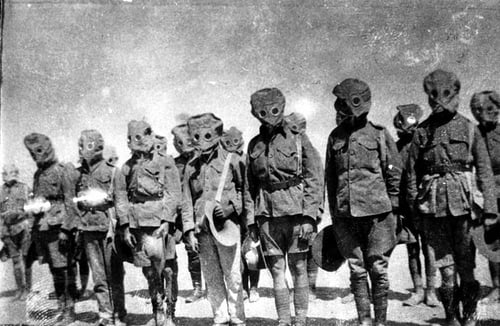THE SURVIVAL OF THE FITTEST
By:
May 18, 2023
A series dedicated to poems, published c. 1900–1935, the Radium Age sf-adjacent themes of which include: dystopia and utopia, far-out mathematics and the fourth dimension, Afro-futurism, catastrophe, future war, new technologies, scientific breakthrough, dehumanization, cosmic awe, disenchantment and unseen forces, unknowable aliens and singularity. Research and selection by Joshua Glenn; thematic index here.

(In Memoriam, L. C. and T.)
“Those like Mr. Strachey, of The Spectator, who say that without war the race would degenerate.” — Star, March 30, 1915.
These were my friends; Strachey, you did
not know them,
For they were simple, unaspiring men;
No ordinary wind of chance could blow
them
Within the range of your austerer ken.
They were most uninformed. They never
even
So Ignorant and godless was their youth
Heard you expound, with reverences to
Heaven,
The elements of biologic truth.
Had they but had the privilege to cluster
Around Gamaliel’s feet, they would have
known
That hate and massacre also have their
lustre,
And that man cannot live by Love alone.
But having no pillar of flame of your
igniting
To guide by night, no pillar of cloud by day,
They thought War was an evil thing, and
fighting
Filthy at best. So, thus deluded, they
Not seeing the war as a wise elimination
Or a cleansing purge, or a wholesome
exercise,
Went out with mingled loathing and elation
Only because there towered before their
eyes
England, an immemorial crusader,
A great dream-statue, seated and serene,
Who had seen much blood, and sons who
had betrayed her,
But still shone out with hands and
garments clean;
Summoning now with an imperious
message
To one last fight that Europe should be
free.
Whom, though it meant a swift and bitter
passage,
They had to serve, for she served Liberty,
Romance and rhetoric! Yet with such
nonsense nourished.
They faced the guns and the dead and the
rats and the rains.
And all in a month, as summer waned, they
perished;
And they had clear eyes, strong bodies, and
some brains.
*
Strachey, these died. What need is there to
mention
Anything more? What argument could give
A more conclusive proof of your
contention?
Strachey, these died, and men like you still
live.
— As a poet, Squire is best known as the author of The Survival of the Fittest (1916), one of the first collections of poetry to protest World War I. This poem is included in the collection. The poem refers to John St Loe Strachey (1860–1927), a jingoistic British journalist; between 1887 and 1925, he was editor of The Spectator.
PS: Squire’s support of the Georgian poets, and distrust of experimental modernism, led high moderns to disparage the “Squirearchy.” Squire’s social engagement ranged widely. A founding member of the Fabian society, he stood for parliament for both Labour and the Liberals, but later helped organize a quasi-fascist organization.
PS: I have seen a version of the poem where “Strachey” is not the one addressed.
RADIUM AGE PROTO-SF POETRY: Stephen Spender’s THE PYLONS | George Sterling’s THE TESTIMONY OF THE SUNS | Archibald MacLeish’s EINSTEIN | Thomas Thornely’s THE ATOM | C.S. Lewis’s DYMER | Stephen Vincent Benét’s METROPOLITAN NIGHTMARE | Robert Frost’s FIRE AND ICE | Aldous Huxley’s FIFTH PHILOSOPHER’S SONG | Sara Teasdale’s “THERE WILL COME SOFT RAINS” | Edith Södergran’s ON FOOT I HAD TO… | Robert Graves’s WELSH INCIDENT | Nancy Cunard’s ZEPPELINS | D.H. Lawrence’s WELLSIAN FUTURES | & many more.
